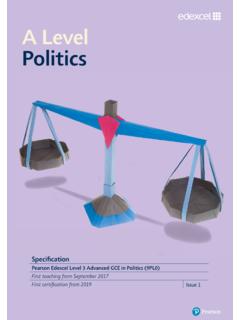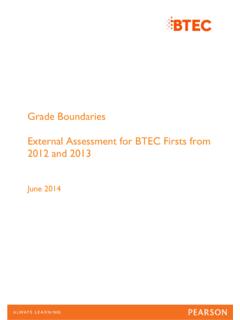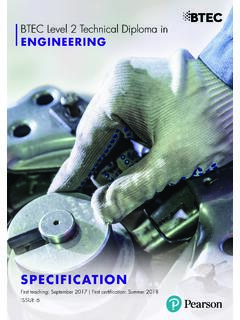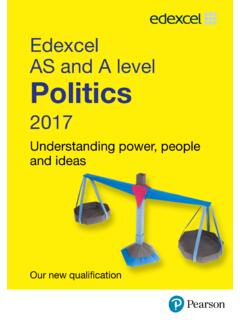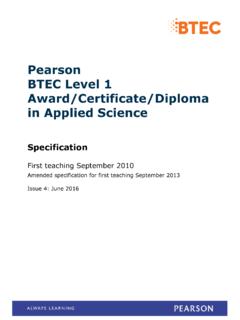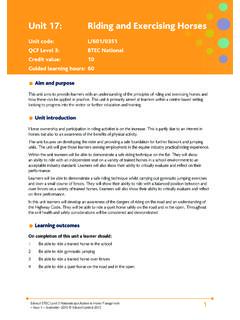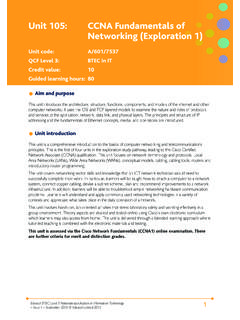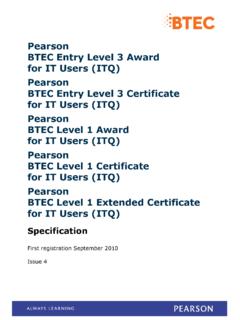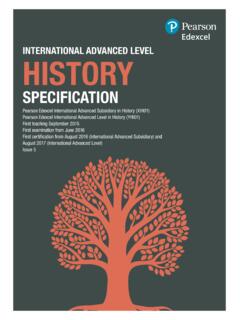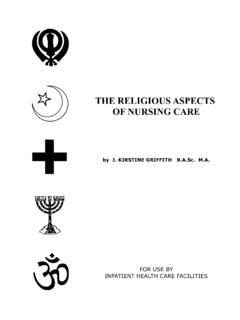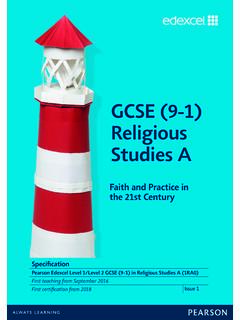Transcription of GCSE (9-1) Religious Studies B - Edexcel
1 GCSE (9-1). Religious Studies B. Beliefs in Action Specification Pearson Edexcel Level 1/Level 2 GCSE (9 - 1) in Religious Studies B (1RB0). First teaching from September 2016. First certification from 2018 Issue 1. Contents 1 Introduction 2. Why choose Edexcel GCSE Religious Studies B? 2. Supporting you in planning and implementing this qualification 3. Qualification at a glance 4. 2 Subject content 6. Area of Study 1: Religion and Ethics 7. Area of Study 2: Religion, Peace and Conflict 43. Area of Study 3: Religion, Philosophy and Social Justice 79. Assessment Objectives 115. 3 Administration and general information 116. Entries 116. Student recruitment and progression 118. Appendix 1: The context for the development of this qualification 123. Appendix 2: Transferable skills 125. Appendix 3: Command Words 126. Appendix 4: Codes 127. 1 Introduction Why choose Edexcel GCSE Religious Studies B? We have listened to feedback from all parts of the Religious Studies community, including higher education.
2 We have used this opportunity of curriculum change to redesign qualifications to reflect the demands of a truly modern and evolving Religious Studies environment. These new qualifications will allow students to apply a wide range of concepts allowing them to confidently interpret, contextualise and analyse the expressions of religions and world views they encounter. This is one of two GCSE Religious Studies qualifications offered. A specification to suit everyone With our suite of two full course and two short course GCSE Religious Studies specifications you can pick the one that meets the needs of all your students. Familiar topics Our areas of study focus on the key questions such as Ethics, Philosophy, Peace and Conflict, which include topics such as marriage and the family, crime and punishment, and matters of life and death. Flexible structure The specification content is split into three Areas of Study, allowing you to pick the two that are best suited to you and your students' needs and interests.
3 Choice of religion Each area of study is available in all seven religions, allowing you to choose the right combination to keep students engaged and motivated through the course. Develops understanding and appreciation Students will develop an appreciation of Religious thought and its contribution to individuals, communities and societies. Helps develop a holistic understanding of religion Students will develop knowledge and understanding of two religions, enabling them to understand and articulate their own and others' beliefs, values and commitments. Develops transferable skills for progression Students will develop analytical and critical thinking skills to enable them to present a wide range of well-informed and reasonable arguments, aiding in progression to AS and A level study. Accessible assessment Our exam papers have been designed with a straightforward structure and consistent use of command words in questions. 2 Pearson Edexcel Level 1/Level 2 GCSE (9-1) in Religious Studies B.
4 Specification Issue 1 July 2016 Pearson Education Limited 2016. Supporting you in planning and implementing this qualification Planning Our Getting Started guide gives you an overview of the new GCSE level qualification to help you to get to grips with the changes to content and assessment and to help you understand what these changes mean for you and your students. We will give you an editable course planner and scheme of work that you can adapt to suit your department. Our mapping documents highlight key differences between the new and current GCSE. Religious Studies qualifications. Teaching and learning There will be lots of free teaching and learning support to help you deliver the new qualifications, including: guidance documents exemplars a student guide materials for your options evenings. Preparing for exams We will also provide a range of resources to help you prepare your students for the assessments, including marked exemplars of student work with examiner commentaries.
5 ResultsPlus ResultsPlus provides the most detailed analysis available of your students' exam performance. It can help you identify the topics and skills where further learning would benefit your students. Get help and support Our support line, ask the expert and online community will ensure you receive help and guidance from us and that you can share ideas and information with other teachers. You can sign up to receive e-newsletters from the subject advisor service to keep up to date with qualification updates and product and service news. The Religious Studies Team can be contacted by email: and by telephone: 0844 463 2817. Learn more at Pearson Edexcel Level 1/Level 2 GCSE (9-1) in Religious Studies B 3. Specification Issue 1 July 2016 Pearson Education Limited 2016. Qualification at a glance Content and assessment overview The Pearson Edexcel Level 1/Level 2 GCSE (9 1) in Religious Studies B consists of three Areas of Study from which students study two, which are then assessed through two externally set examination papers.
6 Students must select a different religion for each Area of Study that they follow. Students who select Catholic Christianity for an Area of Study are not permitted to select Christianity for their second Area of Study and vice versa. Students must complete all assessment in May/June in any single year. Paper 1: Area of Study 1 Religion and Ethics (*Paper code: 1RB0/1A 1G). Written examination: 1 hour and 45 minutes 50% of the qualification 102 marks Content overview Students must study all four content sections based upon their chosen religion. Beliefs Marriage and the Family Living the Religious Life Matters of Life and Death Assessment overview Students must select one religion from a choice of seven (Catholic Christianity, Christianity, Islam, Judaism, Hinduism, Buddhism, sikhism ). The studied religion must be different for each Area of Study chosen. Students must answer all questions. The assessment consists of four questions. The paper may include short open, open response and extended writing questions.
7 The paper will assess spelling, punctuation and grammar (SPaG) and use of specialist terminology and these will contribute a minimum of 5% of marks towards the overall weighting for this paper. *See Appendix 4: Codes for a description of this code and all other codes relevant to this qualification. 4 Pearson Edexcel Level 1/Level 2 GCSE (9-1) in Religious Studies B. Specification Issue 1 July 2016 Pearson Education Limited 2016. Paper 2: Area of Study 2 Religion, Peace and Conflict (*Paper code: 1RB0/. 2A 2G). Written examination: 1 hour and 45 minutes 50% of the qualification 102 marks Content overview Students must study all four content sections based upon their chosen religion. Beliefs Crime and Punishment Living the Religious Life Peace and Conflict Assessment Overview Students must select one religion from a choice of seven (Catholic Christianity, Christianity, Islam, Judaism, Hinduism, Buddhism, sikhism ). The studied religion must be different for each Area of Study chosen.
8 Students must answer all questions. The assessment consists of four questions. The paper may include short open, open response and extended writing questions. The paper will assess spelling, punctuation and grammar (SPaG) and use of specialist terminology and these will contribute a minimum of 5% of marks towards the overall weighting for this paper. Paper 3: Area of Study 3 Religion, Philosophy and Social Justice (*Paper code: 1RB0/3A 3G). Written examination: 1 hour and 45 minutes 50% of the qualification 102 marks Content overview Students must study all four content sections based upon their chosen religion. Beliefs Philosophy of Religion Living the Religious Life Equality Assessment Overview Students must select one religion from a choice of seven (Catholic Christianity, Christianity, Islam, Judaism, Hinduism, Buddhism, sikhism ). The studied religion must be different for each Area of Study chosen. Students must answer all questions. The assessment consists of four questions.
9 The paper may include short open, open response and extended writing questions. The paper will assess spelling, punctuation and grammar (SPaG) and use of specialist terminology and these will contribute a minimum of 5% of marks towards the overall weighting for this paper. Pearson Edexcel Level 1/Level 2 GCSE (9-1) in Religious Studies B 5. Specification Issue 1 July 2016 Pearson Education Limited 2016. 2 Subject content Qualification aims and objectives The aims and objectives of this qualification are to enable students to: develop their knowledge and understanding of religions and non- Religious beliefs, such as atheism and humanism develop their knowledge and understanding of Religious beliefs, teachings, and sources of wisdom and authority, including through their reading of key Religious texts, other texts, and scriptures of the religions they are studying develop their ability to construct well-argued, well-informed, balanced and structured written arguments, demonstrating their depth and breadth of understanding of the subject engage with questions of belief , value, meaning, purpose, truth, and their influence on human life reflect on and develop their own values.
10 Beliefs and attitudes in the light of what they have learnt and will contribute to their preparation for adult life in a pluralistic society and global community demonstrate knowledge and understanding of two religions demonstrate knowledge and understanding of key sources of wisdom and authority including scripture and/or sacred texts, where appropriate, which support contemporary Religious faith understand the influence of religion on individuals, communities and societies understand significant common and divergent views between and/or within religions and beliefs apply knowledge and understanding in order to analyse questions related to Religious beliefs and values construct well-informed and balanced arguments on matters concerned with Religious beliefs and values. 6 Pearson Edexcel Level 1/Level 2 GCSE (9-1) in Religious Studies B. Specification Issue 1 July 2016 Pearson Education Limited 2016. Area of Study 1: Religion and Ethics The focus of this area of study is on Religion and Ethics; this is one of three areas of study, of which students must complete two.
